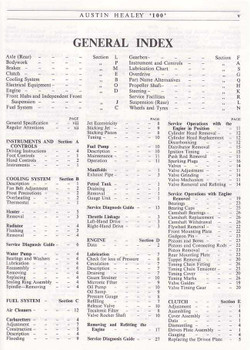Description
By: Bill Piggott .
Description
When Donald Healey displayed a new sports two-seater on his firm's stand at the 1952 motor show he cannot possibly have been envisaging the extraordinary success that it was to enjoy. Yet the reasons for that success are not hard to define today: the car's gorgeous, ageless looks; its mechanical simplicity; its very keen price; the effortless torque of its big four-cylinder engine; its roomy cockpit. The top speed was 100mph and the car was easy to drive: almost everything about it seemed to have fallen neatly into place, though the three-speed gearchange, despite its overdrive, was a less-than-ideal solution, and because the body sat so low on the road owners had to get used to damaged exhaust systems.
The BN1 model — the one with the three-speed gearbox and dual overdrive — was replaced by the four-speed BN2, also with overdrive. The other models in the range were the 100M, which had a high-compression cylinder head and an output of 110bhp compared with the standard engine's 90bhp, and the 100S, the rare competition variant. This had 132bhp, all-aluminium bodywork and disc brakes front and rear. Having commenced in 1953, production of all types of the four-cylinder 100s reached nearly 15,000 before they were phased out in 1956 in favour of the 100/6 model. Most went for export, particularly to North America.
This book opens with an exposition of the background to Donald Healey's creation of the 100 and with an account of his career to that time. This is followed by a description of the successive stages of design and development and of the eventual agreement with Austin. Then comes a detailed technical analysis of the 100, covering all aspects of the chassis, running gear, engine and transmission. This sets the scene for subsequent chapters on the BN2, the 100M and the 100S, each of which receives comprehensive treatment.
The author also provides information on the cars' participation in competition, including the Mille Miglia, Le Mans and Sebring, draws comparisons with rival models like the Triumph TRs and Jaguar Xlcs, and gives advice on the practicalities of owning a 100 today.
Seven outstanding examples of the 100 — including an unrestored Le Mans car — have been photographed for this book and are featured among some 120 colour shots. There are also more than 250 black-and-white illustrations drawn from archives and from sales and publicity material.
This is the first book ever devoted exclusively to the four-cylinder Austin-Healey 100. Its in-depth examination of these most desirable sports cars offers an unrivalled store of knowledge for the many owners and enthusiasts who care passionately about them, and serves as a tribute to the men who made them.
























